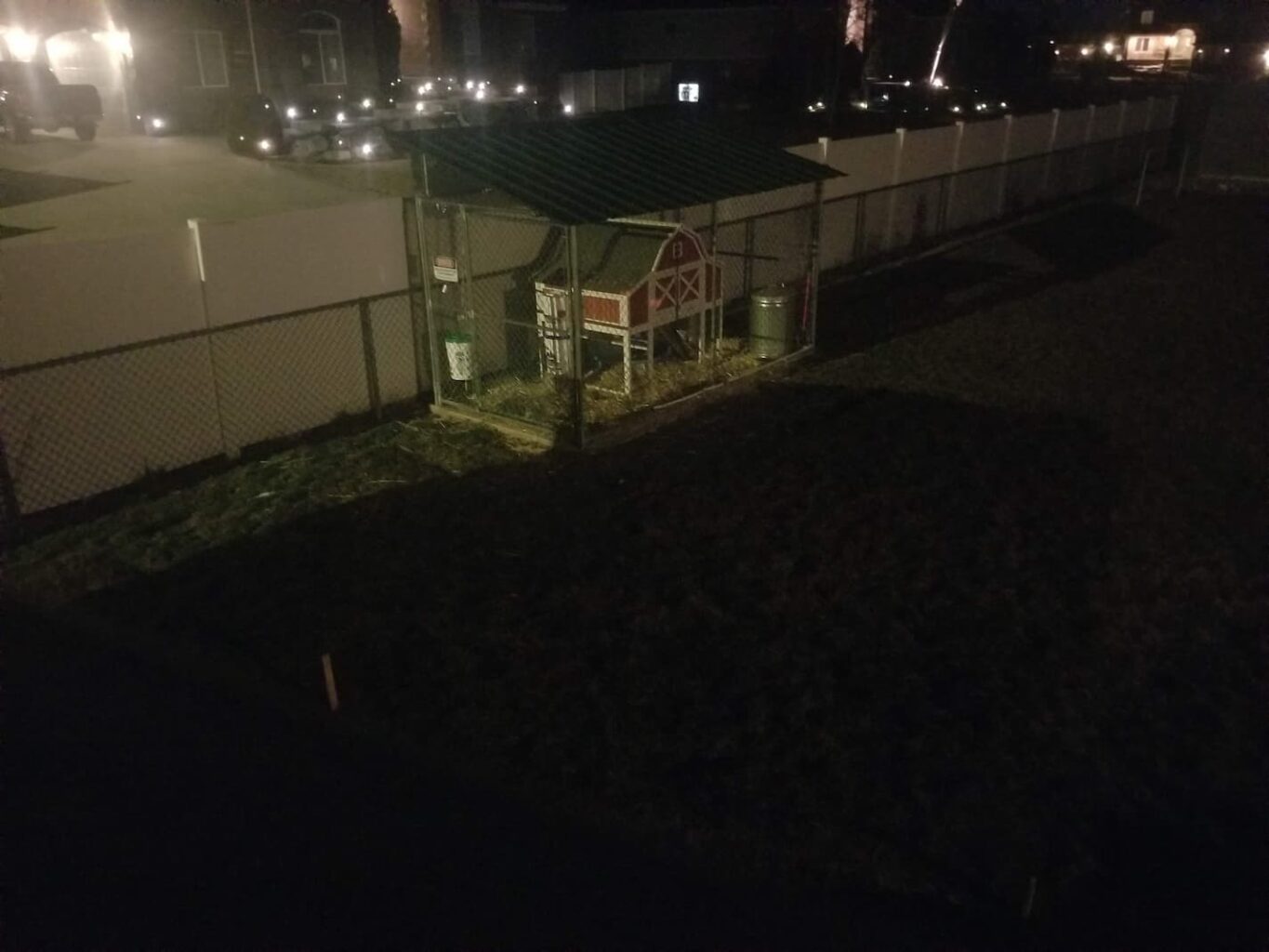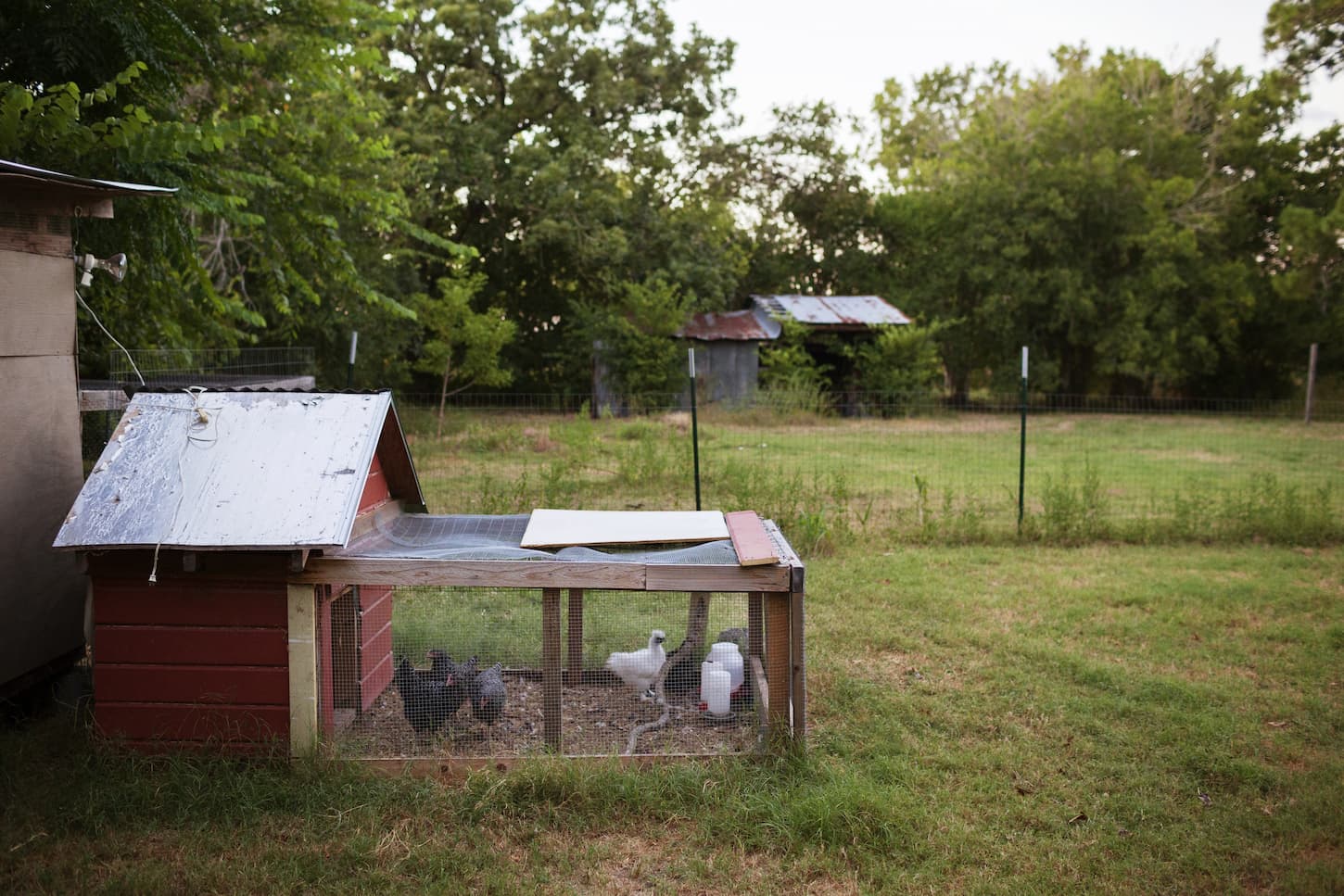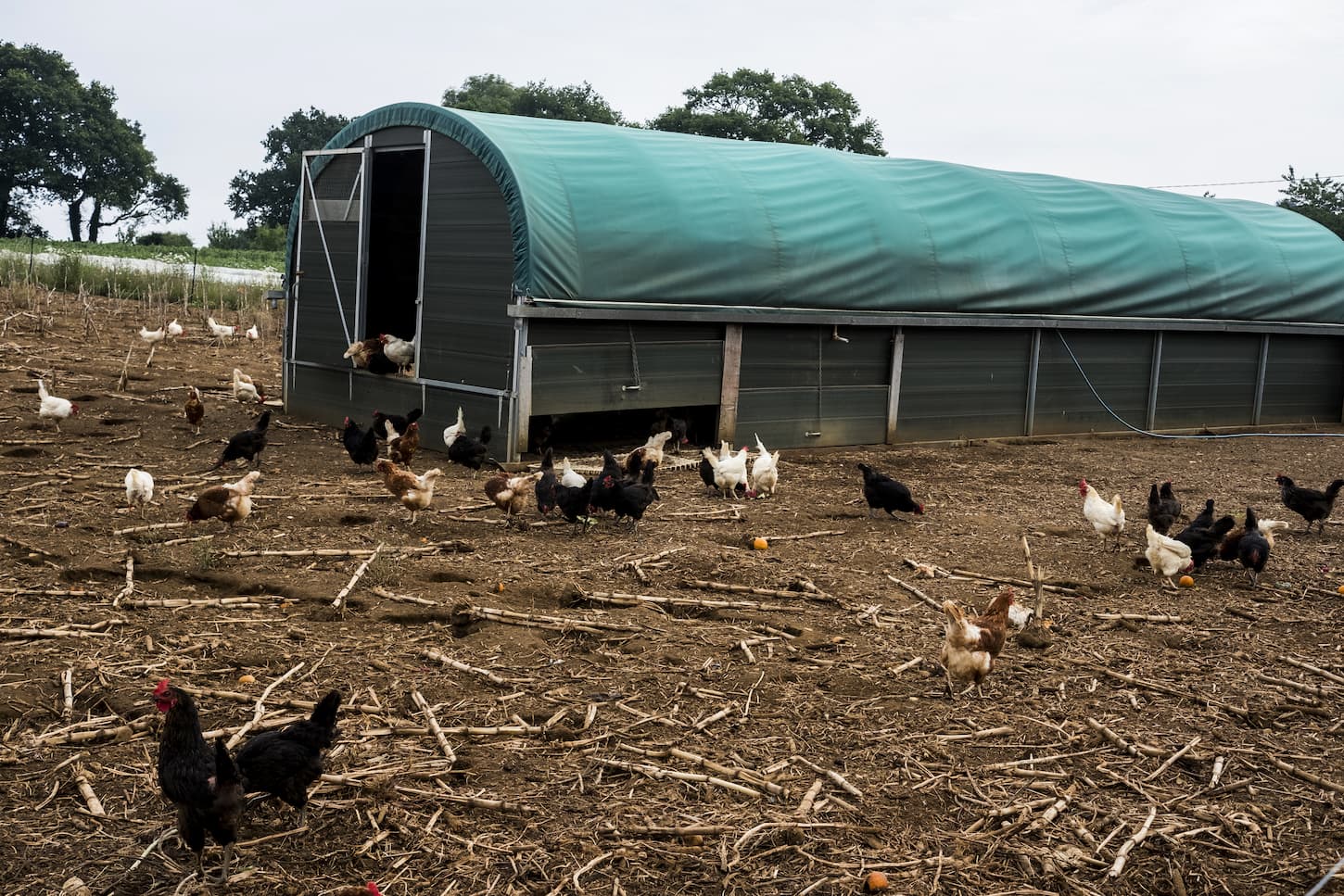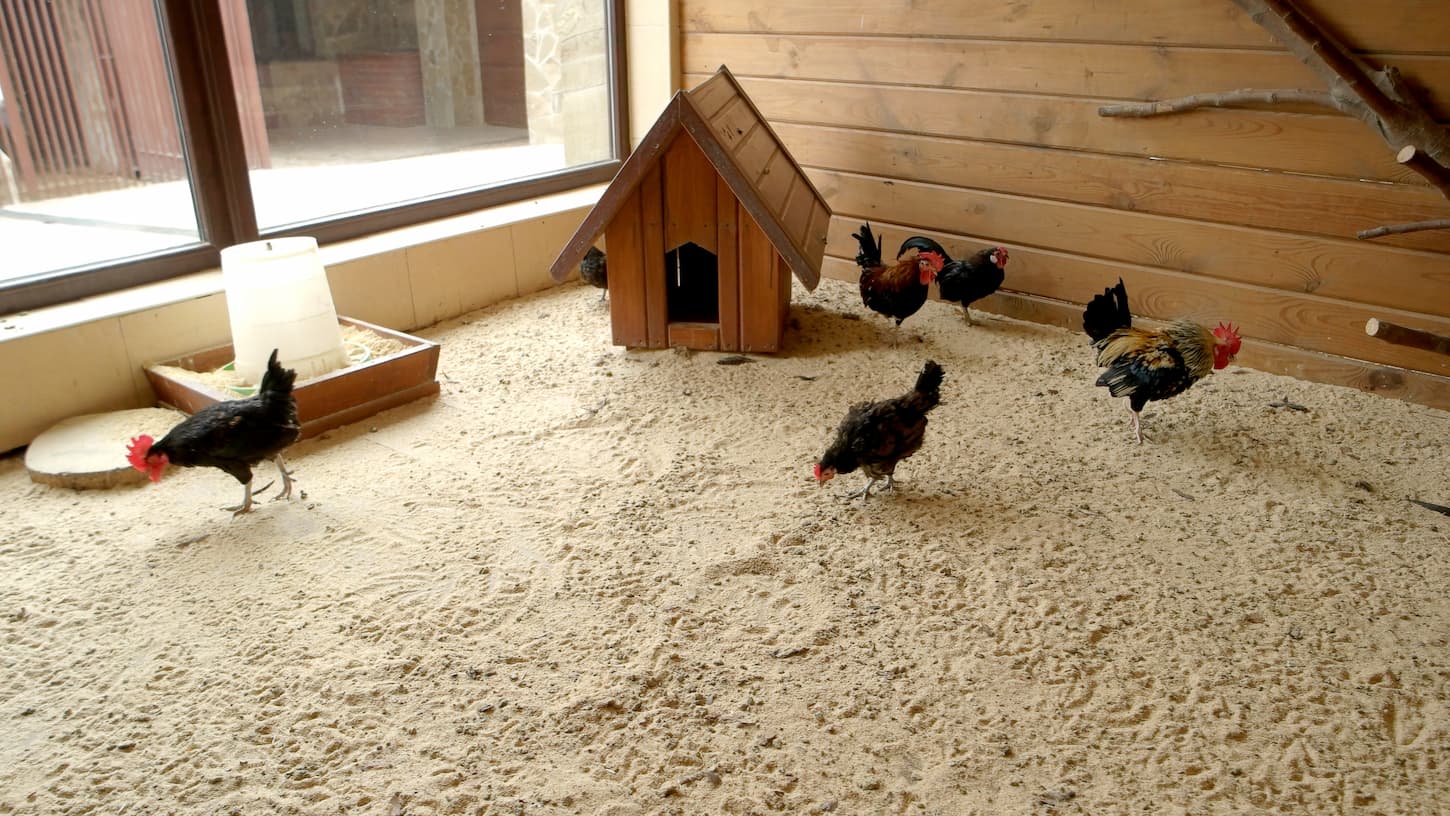Chickens are important farm animals whether you want meat and/or eggs. There are many interesting facts about these animals, including their relationship with the dark. Can chickens see in the dark? And are they afraid of it?
Chickens cannot see in the dark. In fact, they’re considered blind by nightfall. However, they would be able to see with an artificial light source. Chickens tend to be afraid of dark areas both because they cannot see and due to the risk of predators.
Chickens only stay in one spot once their light source goes below a certain level and will move once they are able to see again during the day. Let’s talk about what our feathered friends go through after nightfall. We’ll also be giving out some pointers on how to be a responsible poultry owner and keep your chickens safe during the evenings.

Can Chickens See at Night?
Chickens do not have night vision, though they can see color and detail better than humans can. If there are no artificial lights, chickens lose their ability to see once it gets too dark by nightfall. Due to being almost blind, a chicken will become highly cautious about its surroundings.
The dark causes chickens to be unaware of what’s happening around them. This will cause them to stop everything and begin to roost. These farm fowls won’t even move until the sun rises, making them utterly vulnerable if they are not indoors.
How Good Are Chickens’ Eyesight?
Chickens have excellent eyesight like most birds, even if they are deemed flightless birds (spoiler: chickens can still fly). Two days after hatching, a chick’s eyesight reaches peak sensitivity to detail.
As chicks, they can already navigate through obstacles and accurately peck at objects they aim at.
Just like most birds, chickens have monocular vision. This means their eyes are located at the side of their heads. This allows them to have a wider field of view.
The larger field of view allows this animal to spot predators from a distance. Chickens, which fall under the prey species, usually have monocular vision.
Meanwhile, predators such as hawks and owls are different from most birds. These two types of birds have Binocular Vision, which means they have superior depth perception but a smaller field of view. Because a chicken has eyes on the side of its head, it usually moves its head from side to side to see things better.
Chickens also see color better than humans. Just like other species of birds, chickens can see into the ultraviolet range of the spectrum. This allows them to perceive colors in a way humans cannot. Being able to see color is part of their means of survival.
Also, color shows how well a male chicken is for a mate. Like a peacock, a chicken also uses color to see how to fit a mate is. So, for an animal to suddenly lose its eyesight when it heavily depends on it is a scary experience for them.
Do Chickens Need Light at Night?
Chickens do not need light at night, as they need a minimum number of dark hours to maintain their egg production. Although it’s okay to put an artificial light in the coop, we would suggest keeping it off when the chickens need sleep. They’ll have a difficult time sleeping with the lights turned on.
If you keep the lights turned on in the coop all night, the chickens may start to perceive the light as sunlight and won’t be able to sleep through the night. In addition, by not getting enough sleep the chickens may grow more stressed – leading to unpleasant behavioral changes or decreased egg-laying.
Keep a light on for a couple of extra hours if your area experiences seasons like fall or winter. The extra hours will allow your hens to lay eggs more often. But at any other time of the year, we highly recommend keeping the light in the coop off.
What Do Chickens Do in the Dark?
Chickens roost and sleep in the dark. When it starts to get dark, a chicken will look for an area where it can roost or perch safely through the night. Roosting is the equivalent of sleep. While roosting, chickens usually don’t move at all till the light is bright enough for them to see again.
When a chicken roosts, it will stay completely still since the bird is unaware of its surroundings.
Untrained chickens have tendencies to begin roosting outside. Meanwhile, some chickens are trained to roost in their coops at a particular hour of the day.
It’s recommended to train your chickens to enter the coop before they decide to roost. This is because a chicken will not defend itself while it is roosting. If the chicken is outside, it becomes vulnerable to predators.
When we go check on our chickens in the dark, they’re either hanging out in their coop on the roost, or they’re being broody on any eggs we forgot to collect (or the wooden eggs we leave out there).
- If we check on our chickens without a light source, they don’t do much. It lends a lot of weight to the idea that chickens could sleep through a predator attack, though thankfully we haven’t witnessed that.
- If we check on our chickens with a light source, they’ll look at us and look around, but they look really, really confused. Almost like we woke them up from a dead sleep. How dare we, right?
Either way, though, they’re in the coop, and we designed our coop to be predator and toddler-proof. Because some predators, like raccoons, are kinda like toddlers.

Should Chicken Coops be Dark?
It is recommended that chicken coops are kept dark. The darkness is just as crucial to a chicken as the light is, especially in maintaining egg-laying. Chickens will usually tell their bodies to sleep once the light begins to drop, allowing them to get rest.
A well-rested chicken is less prone to developing stress. Conversely, a stressed-out chicken tends to develop unwanted behaviors that are harmful to itself and other chickens. For example, a stressed chicken is prone to plucking its own feathers and may also start attacking other chickens.
A chicken with proper exposure to sunlight and resting hours also lays more eggs. So, if you would like to get into the egg-laying business, you need to keep track of the chicken’s sun exposure and roosting hours.
Are Chickens Afraid of the Dark?
Chickens tend to be afraid of the dark as they rely heavily on sight. Since the dark makes them incapable of seeing, this can cause them to feel vulnerable and afraid. That is why a chicken will immediately roost once the light drops to a certain level. Similar to adult chickens, chicks are also not big fans of the dark.
However, if a chick is raised by its mother and is used to cooping in the dark, they tend to follow the examples of the older chickens by roosting. Chicks will naturally gather together below their mother hen to roost.
Meanwhile, chicks raised by hand through a hatchery or incubator tend to react to light loss a little more frantically. Unlike the chicks in the coop with the hen, their bodies can’t develop a proper day and night rhythm and won’t sense the change of light before it completely drops.
Incubator-hatched chicks are born with artificial light so their bodies cannot distinguish between day and night. Therefore, a sudden loss of light may cause them to panic instead of defaulting to roosting.
People who raise chickens this way tend to use a heat lamp to illuminate their sleeping area enough to keep them calm.
Eventually, owners will need to teach their chicks about daylight and the dark. We recommend keeping lights off during the day so that the chicks will get used to natural sunlight and allow them to see the shifts of light from day into night.
This will help set the chicks’ body clock so they can tell the time of day based on how the light looks.
Are Chickens Okay in the Dark?
Even if a chicken is afraid of the dark, it will be safe as long as they are inside a closed coop safe from predators. The coop should also be dark so the chicken will have proper rest. Generally, chickens need to rest for about 8 hours at night in order to produce a decent number of eggs.
Seriously, though. Chickens are just fine in the dark.
Can the Chicken Coop Have a Light?
It’s okay to have a light installed in the chicken coop – just make sure to keep it off when it’s not needed. It’s common to need light during the fall and winter seasons since the days are shorter, but only if you want to maintain egg production through the winter.
You want to make sure that the chickens get enough hours of sunlight to lay eggs.
The light can also help guide chickens into the coop. However, the light must be turned off once the chickens have settled in for the evening.

What To Do If Your Chickens Don’t Make It to The Coop in The Evening
Chickens can be trained to enter the coop as night falls to avoid them from getting lost. Having a small light in the coop can help guide them towards the enclosure, but it’s also possible to train them without the light.
It’s a good idea to have all of your chickens in the coop before nightfall. The coop protects them from predators like foxes or dogs. Unfortunately, sometimes some chickens end up lost in the evening.
Feeding the chickens an hour before they need to roost near the coop will help them get used to being near the area where it’s safe to roost.
Eventually, the chickens will adapt to the routine and will naturally be near the coop to be fed. Getting them familiar with the sound of your voice when calling out will also help to gather them all in one area.
While this is an effective method, there are some occasions when a chicken may still wander too far from the flock and miss its chance to make it back to the coop safely.
If you notice one of your chickens missing during the evening, do not panic. It’s easier to catch chickens when they are roosting since they do not run away. Just find the roosting chicken and pick it up. The chicken will usually not bother to run away or resist.
What Happens to the Chicken When it is Stressed?
Stressed chickens can halt laying eggs, get sick, or even die. Besides predators, not enough light or too much light is one of the main things that will cause stress in chickens. Unlike other stressors, depriving or exposing a chicken to light takes time to build stress for the bird.
However, because symptoms of this kind of stress take time, it’s common for owners to forget about it. Stress for a chicken means that it will develop destructive behaviors, its immunity to diseases is severely lowered, and in a worst-case scenario, it can also cause the chicken to die.
Issues with light are avoidable, so as owners it’s our responsibility to ensure our chickens are well rested and have enough sunlight throughout the day. Before it’s too late pay close attention to your flock. Chickens will develop bad habits as an early sign of stress.
Some signs of stress show through abnormal feathering, constant preening of its feathers, plucking its own feathers, increased aggression towards other chickens, and aimless and restless pacing around the house floor.
In addition, a delay or withdrawal from egg laying is both a result and an indication of stress as well.
For chicken breeds that lay colored eggs, you may notice that the egg is paler than usual if the chicken is stressed. Once you see any of these indications, it’s best to figure out what is causing your chicken to be stressed. Your light bulb might actually be the problem here.
Are Heat Lamps Recommended for Chicks?
If chicks are under their mother’s care, there is no need for a heat lamp. However, if the chicks were hatched by hand, then we recommend getting a heat lamp. While heat lamps help chicks, we would also recommend slowly making them independent from the light and heat the lamp provides.
Slowly decrease the time a lamp is on during the evening to get a chick used to total darkness. While they might panic the first few times while doing this, this will benefit their health in the long run. It’s recommended that chicks have at least 16 hours of darkness a week after they have hatched.
However, for chicks in the coop with their mother, you can just rely on regular daylight hours and night hours for them. The presence of their mother hen is enough to calm chicks down through the evening, and the hens also provide just enough heat for the chicks to remain warm and feel secure.
If you want more specifics, make sure you read my article, Light and Heat Requirements for Baby Chicks: The Essential Guide.

Key Takeaways and Next Steps
Chickens need some downtime and even some time in the dark. That doesn’t mean they’re super excited about it, though, as there are so many nighttime predators that they need to be wary of. That’s why they perch – or go into the coop, though.
So make sure you have a great coop setup, and here are some articles I’ve written that’ll help you get that done.
Some of the tips will help you predator-proof your chickens’ area, while others are just useful tips to help your flock stay happier and healthier. Either way, go give those a read!
Resources
Learning from your own experience is essential, but learning from others is also intelligent. These are the sources used in this article and our research to be more informed as homesteaders.
- Azoury, Alex. “How Much Light Do Chickens Need To Keep Laying?” Eco Peanut, www.ecopeanut.com/how-much-light-do-chickens-need-to-keep-laying. Accessed 8 Mar. 2022.
- Chickenpal. “Can Chickens See in the Dark?” Chicken Pals, 22 Oct. 2021, chickenpals.com/can-chickens-see-in-the-dark.
- Howell, Cheryl. “Can Chickens See in the Dark?- Interesting Facts About Chicken’s Vision.” The Happy Chicken Coop, 18 Jan. 2022, www.thehappychickencoop.com/can-chickens-see-in-the-dark-interesting-facts-about-chickens-vision.
- Penny, Hennie. “How to Get Your Chickens to Return to the Coop at Night.” Chickenguard, 13 Mar. 2018, www.chickenguard.com/chickens-return-coop.
- Willis, Lynda. “Stress In Chickens and Hens | How to Treat Stressed Hens Naturally.” Natural Farm Health, 13 Feb. 2021, www.naturalfarmhealth.co.uk/stress-in-chickens.
